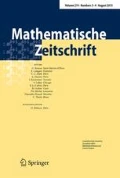Abstract.
We prove a Nekhoroshev type result [26,27] for the nonlinear Schrödinger equation \begin{eqnarray} iu_t=-u_{xx}-mu-u \varphi (|u|^2) , \end{eqnarray} with vanishing or periodic boundary conditions on \([0,\pi]\); here \(m\in\mathbb{R}\) is a parameter and \(\varphi:\mathbb{R}\to\mathbb{R}\) is a function analytic in a neighborhood of the origin and such that \(\varphi(0)=0\), \(\varphi'(0)\not=0\). More precisely, we consider the Cauchy problem for (0.1) with initial data which extend to analytic entire functions of finite order, and prove that all the actions of the linearized system are approximate constants of motion up to times growing faster than any negative power of the size of the initial datum. The proof is obtained by a method which applies to Hamiltonian perturbations of linear PDE's with the following properties: (i) the linear dynamics is periodic (ii) there exists a finite order Birkhoff normal form which is integrable and quasi convex as a function of the action variables. Eq. (0.1) satisfies (i) and (ii) when restricted to a level surface of \(\left\Vert u_{L^2}\right\Vert\), which is an integral of motion. The main technical tool used in the proof is a normal form lemma for systems with symmetry which is also proved here.
Similar content being viewed by others
Author information
Authors and Affiliations
Additional information
Received June 23, 1997; in final form June 1, 1998
Rights and permissions
About this article
Cite this article
Bambusi, D. Nekhoroshev theorem for small amplitude solutions in nonlinear Schrödinger equations. Math Z 230, 345–387 (1999). https://doi.org/10.1007/PL00004696
Issue Date:
DOI: https://doi.org/10.1007/PL00004696


